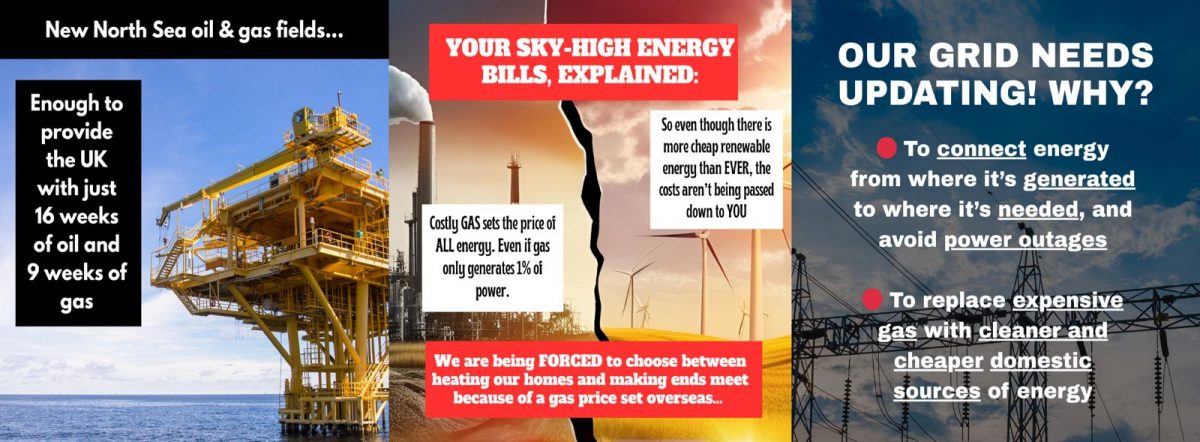2025
June: Warm Homes Plan
Following reports that funding for the Warm Homes Plan is under threat and in support of other charities and campaign groups, resources from the activity outlined below were diverted to highlight the importance of a full funded Warm Homes Plan in areas where key politicians are based. Sources and wider information are available here.
May: Digital campaigns to deliver a support solutions to fuel poverty
As the cost-of-living crisis continues to hit households, we have agreed to deploy paid for social media adverts on Meta platforms to cut through misinformation and build support for clean, affordable energy solutions. This is part of a broader strategy to strengthen public backing for policies that make energy cheaper and fairer – thereby reducing fuel poverty.
At the heart of the reason behind this work is a growing concern: energy disinformation is being used to delay progress, often by misrepresenting the causes of high energy bills. These narratives are especially harmful in low-income communities. That’s why activity will reach specific geographic audiences that:
- Have high rates of fuel poverty
- Are politically important to ministers who make decisions about energy issues
- Have renewable energy in the vicinity – or the potential for it
We will look to reach social media users who we also know are persuadable to the solutions that we need to see, but exposed to disinformation that undermines support for energy efficiency and clean energy.
By using relatable digital content, we aim to challenge falsehoods, explain the real causes of rising bills, and demonstrate how clean energy policy can bring down costs — especially for those hardest hit.
All the facts used in the campaign are sourced and build on work already undertaken by the Coalition over recent years. The sources for the content and further reading are outlined below.
Gas is driving up energy bills — even for those using electricity — and renewables are set to be 61% cheaper than gas in 2025.
Sources: Energy UK, Oilprice.com, Sustainability by Numbers, Current News, NESTA
For more on how energy bills are calculated, visit our price cap page and the Tariff Watch reports published between 2022 and 2025.
Drilling for more North Sea Oil and Gas won’t bring down bills because there isn’t enough left to meet the UK’s energy needs.
Sources: Uplift, Guardian, BBC News
This issue has previously been explored by the Coalition in this article on the links between fossil fuels and fuel poverty.
To ensure UK energy security and bring down bills, the UK’s electricity grid must be modernised.
Source: National Grid
Also read our report on how electricity networks are paid for, our response to the RIIO3 consultation [pdf] and to the UK Government’s fuel poverty strategy review.
Reform won’t bring down the price of energy bills because they’re intent on blocking projects that produce cheap energy.
Source: BBC
See our letter to the former energy secretary on planning for energy – and other issues.
Reform won’t bring down the price of energy bills because they have significant links to oil and gas companies, who have a vested interest in keeping prices high.
Sources: Prospect Magazine, DeSmog
Read more about our energy industry profits tracker and support for the energy profits levy.
The funding for this work is supported by Maker Change Studio and is not funded by Coalition members’ contributions.
2024: Promoted posts activity
During 2024, our news content was promoted on Twitter to raise awareness of issues among key audiences. This was targeted based on followers of other organisations we wished to influence. This was paid for (£400) by the Warm This Winter campaign and not funded by members’ contributions. The Global Strategic Communications Council also donated £300 to fund promoted Twitter content hosted on the Twitter account explaining the Ofgem price cap.
A limited £100 social media campaign was also delivered to reach potential councillors and encourage them to find out more about the End Fuel Poverty Coalition councillor pledge. This was agreed as part of the 2024 workplan for the Coalition.
2023: Emergency Energy Tariff
During 2023, our news content was promoted on Twitter in a last ditch attempt to improve support for households during winter 2023. Posts promoted the idea of a Emergency Energy Tariff to the followers of key decision makers. This was paid for (£150) by the Warm This Winter campaign and not funded by members’ contributions.
2022: No paid for activity on social media
2021: Case study recruitment
A limited spend (£30) on Twitter was deployed to encourage our followers to speak out about the impact of fuel poverty by being a case study. This was agreed as part of the 2024 workplan for the Coalition.
No paid for activity took place before 2021.

